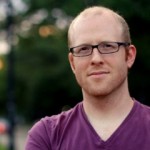Alex Ihnen
St. Louis, Missouri

Born and raised in North Manchester, Indiana, Alex Ihnen earned a bachelor’s degree in journalism and a master’s in public affairs from Indiana University. He has also studied at the University of South Australia in Adelaide and the Universita per Stranieri in Perugia, Italy. Alex is the editor of nextSTL.com, an hub for dedicated members of the St. Louis community and those interested in getting involved. NextSTL covers a wide range of topics from historic preservation to public policy, boasting 7,000 topics and 2,700 registered users. Alex is also a key organizer of the Open/Closed vacant property conference and serves as chair of City to River, an organization dedicated to improving connections between the riverfront and downtown. Alex lives in University City with his wife, Katie, an MD/Ph.D. student at Washington University, and their two children, Lucy and Oscar.
Presentation(s):
Empty Space as Common Ground: Open/Closed and Deliberative Innovation
Day 2 / Apr, 13 @ 10:30 am
1st Floor : Room A
Open/Closed is the middle ground between the extremes; it is the collective efforts of St. Louis residents envisioning collaborative solutions for empowerment. As an annual summit, Open/Closed strives to facilitate thoughtful, open conversation about population flight, disinvestment, and vacancy. As a civic organization, Open/Closed engages uncommon partners to link the emergent results of community-oriented creativity, enterprise, and policy. They are helping develop infrastructure for lateral civic thinking that will unsettle the most durable presumptions about the urban fabric. Unsatisfied by proclamations of population growth and conventional economic development, Open/Closed recognizes the potential for artists, entrepreneurs, advocates, neighbors, and leaders to learn through iteration, engage on contested issues, and acknowledge the multiplicity of forms. Open/Closed is a creative enterprise because the animated civil society, ultimately, is the crafting of the possible. St. Louis, Detroit, Cleveland, Youngstown, and Pittsburgh are human places. Crafted by people, dismantled by people, and, hopefully, remade by them, we have been instructed to revile the chaos, disorder, and collapse of our past. In contrast, Open/Closed imagines this biography as our defining attribute. The organizers lionize not the possibility to rewrite these cities into creative, political or social legibility, but to enhance our literacies to the existing city and its diversity of practices. This panel will help tell this story, but it will surely be incomplete, an incompleteness that should inspire all creative practitioners to find all the possible authors.





